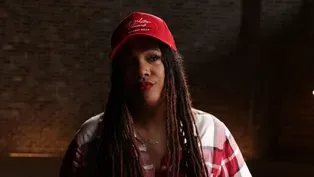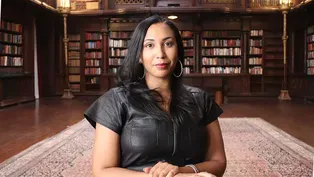
90's Hip Hop Reflected Realities on the Street
Clip: Episode 3 | 2m 10sVideo has Closed Captions
Many fans and musicians saw 90's Hip Hop as a reflection of reality.
Hip Hop continues to establish itself in the 1990s, reflecting the social reality faced by many African Americans in disadvantaged communities ravaged by drugs, gangs, and crime. Featuring artists Warren G, journalist Soren Baker, historian Dr. Hasan Kwame Jeffries, and Leah Wright Rigeur.
Problems with Closed Captions? Closed Captioning Feedback
Problems with Closed Captions? Closed Captioning Feedback

90's Hip Hop Reflected Realities on the Street
Clip: Episode 3 | 2m 10sVideo has Closed Captions
Hip Hop continues to establish itself in the 1990s, reflecting the social reality faced by many African Americans in disadvantaged communities ravaged by drugs, gangs, and crime. Featuring artists Warren G, journalist Soren Baker, historian Dr. Hasan Kwame Jeffries, and Leah Wright Rigeur.
Problems with Closed Captions? Closed Captioning Feedback
How to Watch Fight the Power: How Hip Hop Changed the World
Fight the Power: How Hip Hop Changed the World is available to stream on pbs.org and the free PBS App, available on iPhone, Apple TV, Android TV, Android smartphones, Amazon Fire TV, Amazon Fire Tablet, Roku, Samsung Smart TV, and Vizio.

Chuck D, Lorrie Boula and Yemi Bamiro
PBS spoke with Executive Producers Chuck D and Lorrie Boula, and Series Director Yemi Bamiro, about the evolution of Hip Hop, its influence on popular culture, the next generation, and more.Providing Support for PBS.org
Learn Moreabout PBS online sponsorship(dramatic music) - A lot of people, especially young white kids, very quickly learned that unfortunately a lot of the music was based on what was happening in the United States.
(dramatic music continues) - [Interviewer] Have you ever been shot at?
- Yeah.
- [Interviewer] What happened?
- Nothing, I got away.
- [Guest Speaker] People wanted to hear these stories because they're authentic.
(dramatic music continues) - It's like a tour guide through the streets.
I don't have to ride down Crenshaw to find out what's really going on.
I could buy me a gangster tape.
(dramatic music continues) - But the white establishment didn't like it 'cause you had these articulate, angry black men exposing some of the ugly truths of the United States, and that was intimidating, dangerous, and frightening to a lot of people because now these guys do have a voice.
Now they have the microphone.
- In the nineties, you know, a lot of things were escalated, and things were getting worse because we had more police brutality, a lot of gang activity at the same time as far as a lot of drive-bys.
(siren wailing) (dramatic music continues) - One of the things that is important to understand is crime as a whole, and particularly violent crime, had been increasing for 20 years.
(siren wailing) (walkie talkie crackling) - [Civilian] He got his gun out!
- [Reporter] Anger and tension exploding here, as in so many cities, a feeling the crime is out of control.
- Watching brothers get killed, I mean, it can take a toll on your life.
It can take a toll on your mind.
(dramatic music continues) - Urban communities, as African-American communities, as Latino communities, are under assault, is they're under siege.
- What this is, is this is a search warrant.
- [Leah] They are being ravaged by drugs and by crime, and by poverty and inequality.
(dog barking)
Video has Closed Captions
Preview: Ep3 | 30s | Experience the 1990s and the unstoppable rise in the popularity of Hip Hop. (30s)
‘Tough on Crime’ Bill Translates into Mass Incarceration
Video has Closed Captions
Clip: Ep3 | 4m 58s | 1 in 3 Black males get caught up in the criminal justice system after the bill passes. (4m 58s)
Providing Support for PBS.org
Learn Moreabout PBS online sponsorshipSupport for PBS provided by:













